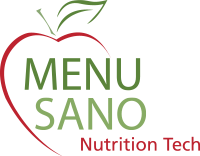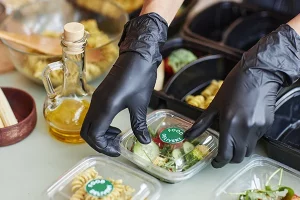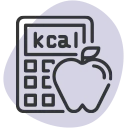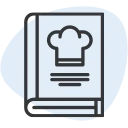In this episode, we discuss the increasing number of food tech startups in the restaurant and food industry. This growing industry is expected to reach 3 trillion dollars in revenue by 2020, and last year alone, food tech startups raised $5.7 billion in funding deals.
Food tech startups are disrupting an industry that’s been hesitant to embrace change for a very long time. From pioneering new ingredients and packaging to revolutionizing how consumers get their food from grocery stores, they’re undeniably transforming and making their mark in the food industry. In particular, food couriers are the industry’s biggest winner right now; with revenue in the online food delivery segment expected to reach $161.7 billion by 2023.
This explosion of innovation is transforming the way consumers view their food; they’re becoming increasingly aware of where their food is sourced and are demanding higher levels of transparency about their nutrition and health. Now, consumers want to know what’s in their food and will support businesses that align with their nutrition needs and ethical views.
This raises the question: how can food tech startups capitalize on consumer trends and how can they thrive in this increasingly crowded market?
The guide will undeniably impact the way Canadians view nutrition and their subsequent eating habits, so how will this impact the food industry and restaurant businesses?
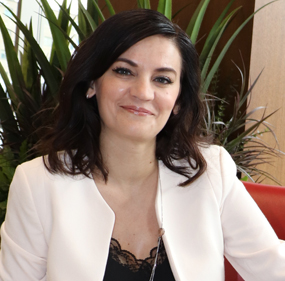
Interview Transcription
Here to talk to me about being an innovator in the food-tech industry and running a successful food startup is MenuSano founder Sonia Couto.
M: Tell me about why you launched MenuSano.
S: MenuSano was developed ahead of its time because we knew that change had to happen in the food industry and we wanted to be pioneers in that space. Diabetes and childhood obesity are on the rise. Through conversations with other people, I learned that most individuals were aware that they didn’t eat healthy food but lead such busy lives, and that dining out was the most convenient option. When I shop for groceries, I can see nutrition facts on food labels. I thought, “Why can’t I access this information at a restaurant so that I’m not afraid to eat out?” I wanted to have access to information that would allow me to make healthier choices. We want to provide information, so that consumers can make choices and be in control of their own health.
M: What have you learned about the food tech space through launching MenuSano?
S: The industry has changed a lot since we launched MenuSano. When we started, we were rejected by almost everyone. People were scared of the technology and what would happen if their clients had access to nutritional information. What I learned is that you don’t have to be disruptive. Rather, approach it in a manner that shows the added value that you offer the business.
M: What are some challenges that you faced in this industry?
S: Our biggest challenges have been change and fear. First, it was frustrating because we knew we had a great product, but our target audience didn’t see its value. They didn’t know how their clients would react if that information was provided and they feared that they’d lose clients. In a nutshell: if clients knew what was in their food and what they were eating, they wouldn’t return to that particular facility. But they didn’t think of it as an opportunity to attract new customers who did see value in eating healthy and who wanted access to nutritional information.
M: What do you think people get wrong about running their own business or startup?
S: The assumption that everyone will love what you’re doing, embrace it quickly, and that you’ll make a lot of money right away. It’s not like that at all! Being an entrepreneur isn’t for everyone; it takes a lot of hard work, lots of long hours, dedication, perseverance, discipline, and handling rejection. There’s no constant recognition for your hard work.
M: You’ve been in this industry for almost 12 years. What’s one piece of advice you wish you had when you first started?
S: Disruptive technology displaces established technologies and shakes up that industry. It could also be a groundbreaking product that establishes a brand new market. With these types of products, a lot of education and research are integral to the process. When I first launched my startup, I thought developing the product and presenting it to investors would be enough and we’d be selling the product right away. But that’s not how it works. We actually had to stop trying to sell the product and shelved it for some time to shift our focus instead on working with public health departments on education initiatives that would impact the food industry in a positive way. My first piece of advice is that if you’re working with disruptive technologies, learn how it will impact the industry, how the user will adapt to it. Disruptive technology is a trendy word, but you have to know how your product is going to affect the industry, and how you’ll innovate your product so that consumers embrace it and overcome the fear associated with it.
Secondly, my biggest advice for entrepreneurs is to bootstrap if you can. Bootstrapping means you’re using your own money, which makes you more careful and strategic about how you spend money. This ensures you’re spending money on things that actually matter, and it makes you more business savvy. Knowing you have a limited budget to spend makes you work to bring in revenue faster to cover your costs. This teaches a young entrepreneur many valuable lessons: how to run a business, how to make the right decisions, how to watch expenses, and how to be profitable.
M: So you’re advising young entrepreneurs to be patient and invest time in your product, instead of trying to sell it right away as the key to growth?
S: In my own experience, bootstrapping has taught me invaluable lessons that are enabling me to be successful now. And this has allowed me to be a better leader as the company continues to grow.
Read more: Nataly Alves from Silstar Foundation
